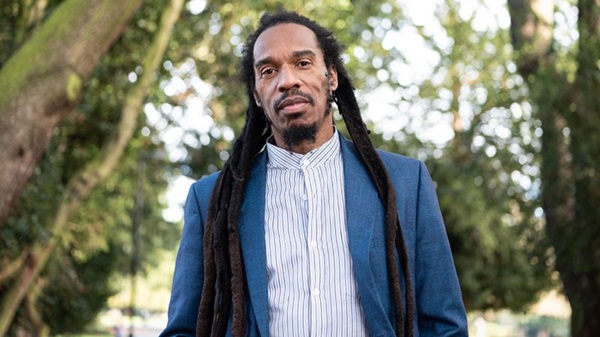
Obituary: Benjamin Zephaniah
Benjamin Zephaniah
1958 – 2023
Nicholas Tucker remembers the remarkable Benjamin Zephaniah.
Irrepressible, wonderfully talented, unpredictable, sometimes mischievous but deeply principled, Benjamin Zephaniah was a gift to the British literary world both senior and junior. While expressing anger at the extreme racism he had suffered when young he still remained permanently on hand not just for a quote but very often a joke too. His public following extended over every class and colour. Instantly recognisable in life or on the screen, his was a solo act that will long be remembered.
Born Benjamin Springer, his early life in Handsworth, Birmingham, shared with seven other siblings, was marred by violence from his father Oswald, a postman originally from Barbados. His mother, a nurse from Jamaica, also suffered and after a particularly savage outburst escaped the family home taking ten-year old Benjamin with her. Now living in poverty and unable to settle he was the only black pupil in his new school, suffering repeated racist taunts and bullying. His next school was better and it was here, although dyslexic, he began to exhibit his extraordinary gift for poetry. He was dubbed ‘Zephaniah’ after the Old Testament prophet by the elders of his mother’s church who believed his verbal powers could indicate that he too might one day be ‘treasured by God.’ The name stuck.
Also often getting into trouble and at 13 still unable to read or write, he was finally expelled and then spent time first in an approved school and then a Borstal. In his late teens he was imprisoned for affray and burglary. But coming under the influence of Rastafarianism in prison he made a complete break aged 22, leaving Birmingham for London to join in the burgeoning punk and alternative comedy movements. His first poetry book was published in 1980 followed two years later by an album. Film work, television and spots on the radio quickly followed, with a final count of 14 poetry books, 7 ‘dub’ poetry albums based on meshing Jamaican patois with reggae rhythms, numbers of novels and some children’s books.
One of these, Talking Turkeys, was an immediate hit. Lines like ‘Be nice to yu turkeys dis christmas Cos’ turkeys jus wanna hav fun’ were already popular from his frequent poetry readings. Reprinted after six weeks, this volume was followed by another collection, Funky Chickens, taking on issues surrounding war, racism, bullying, preserving the environment and animal rights. A vegetarian from aged 12, he later became a leading light in The Vegan Society.
There was also a novel Face about a young man trying to cope with what the author describes as ‘facial discrimination’ arising from his character’s disfiguring injuries after a car accident. He gradually comes to understand that the unkindness he now often receives from others is a mirror for the attitudes he once held himself as gang leader. After that Refugee Boy describes how young Alem, whose father is Ethiopian and his mother from Eritrea, spends a welcome holiday in London away from the continual strife at home. But one day he wakes up to find his father gone, with Alem now having to make his own way in a new country. Windrush Child, written towards the end of Zephaniah’s life, swiftly became standard school reading along with much of his poetry.
In the Authorgraph published in this magazine in 1998, he describes to fellow writer Errol Lloyd how he believed his role was to be ‘a newscaster when the news is not picking up our stories, so must tell that news through poetry.’ Increasingly celebrated for doing just this he toured abroad for the British Council where he was widely appreciated by many including Nelson Mandela, who wanted to meet him on his 1990 visit to the UK. At home he was appointed Professor of Poetry and Creative writing at Brunel University, later spending three months each year in China practising tai chi. The notion that he might become the next Poet Laureate after Carol Ann Duffy was rejected by him in forthright poetic terms: ‘Don’t take my word, go check the verse/ Cause every laureate gets worse.’ The offer of an OBE was also turned down, this time in prose: ‘Stick it, Mr Blair and Mrs Queen. Stop going on about the empire.’
Public recognition was now frequent, particularly after he accepted the part of Jeremiah Jesus, a street preacher also bearing long dreadlocks, in the television series Peaky Blinders. Claiming to be ‘Still as angry as I was in my twenties,’ he talked freely about some of his own past behaviour which he now regretted, including the physical abuse of former girlfriends. But there were many positive memories too, with his autobiography, The Life and Rhymes of Benjamin Zephaniah, published in 2018, an eloquent reminder of a truly remarkable person who died of a brain tumour aged only 65.





 IBC
IBC